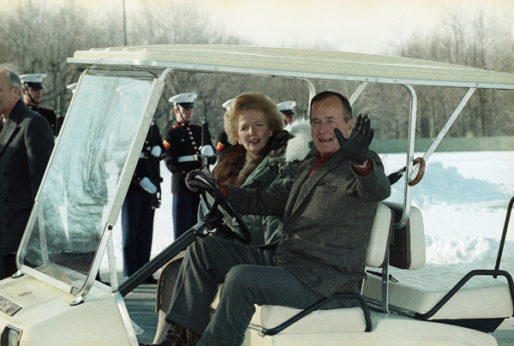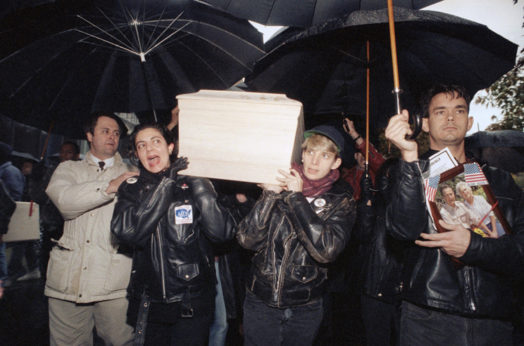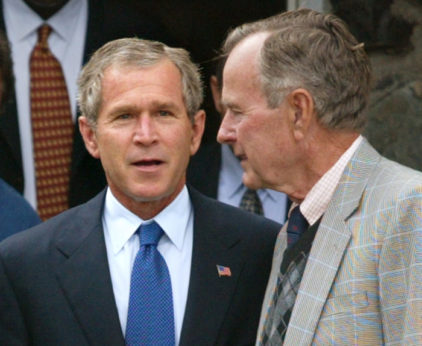
WASHINGTON — The old Latin phrase is “De mortuis nil nisi bonum,” translated as “speak nothing but good of the dead,” but when it comes to George H. W. Bush, the 41st president of the U.S., who died last week, you really – despite the blather being aired – can’t apply that.
That’s because Bush’s record – as congressman, scion of wealth, GOP national chairman, CIA director, Ambassador to China, vice president under Ronald Reagan, and president – really leaves little to celebrate. And let’s not forget his worst legacy: George W. Bush.
George H.W. Bush grew up with a tradition of noblesse oblige where sons of the upper classes were supposed to devote at least some of their lives to public service. Left unsaid: Doing so often enriched their own fortunes along the way.
A war hero after his plane was shot down during World War II in the Asian theater, Bush inherited that wealth and that tradition from his father, Prescott, a Republican senator from Connecticut. Prescott Bush earned the first family fortune, by, among other activities, being the U.S. financier for Thyssen Krupp, the German arms conglomerate.
But George H.W. Bush garnered his own cash by going into the oil business in Texas, profiting by the largesse in terms of tax breaks and subsidies that industry lobbied for and got from compliant Congresses and presidents. By the time he was 40, Bush was a millionaire.
And then he went into politics. George H.W. Bush’s first race, against incumbent Sen. Ralph Yarborough, D-Texas, in 1964, foreshadowed the rest of his political career. He lost, narrowly, against one of the Lone Star State’s few progressives, in a campaign that leaned heavily on conservative themes, including backing right-wing GOP nominee Barry Goldwater.
That continued when Bush won a congressional seat in Houston in 1966, running against the 1964 Civil Rights Act. He vowed he would never have voted for it. He later, reluctantly, voted for the 1968 Fair Housing Act, but only after other conservatives watered it down. Even then, Bush constituents protested. He won re-election in 1968, ran for Senate again in 1970, and lost.
From then until he won the White House, Bush’s career depended on his connections. He held a series of offices, all of them bestowed at the hands of GOP politicians.
Bush’s presidency was known for its concentration on foreign policy and its relative inattention to domestic affairs, including and especially his ignoring of the AIDS crisis enveloping the nation.
On foreign policy, Bush’s promoted Solidarnosc, the anti-communist U.S.-backed –trade union movement whose success in Poland signaled the beginning of the breakup of socialist Eastern Europe.

His commitment to ending socialism continued for years, beginning with his support for right wing religious fundamentalists battling the socialist government in Afghanistan through his ardent support for exporting of capitalism into the formerly socialist countries., including and especially into the former German Democratic Republic or East Germany as it was known.
The other came during the 1992 presidential campaign, when Bush showed how out of touch he was with everyday living. He didn’t know what a point-of-sale device – the scanner that replaced cash registers – was.
His big domestic initiative was the “1000 Points of Light,” recognizing private charities which Bush, like other noblesse oblige Republicans, believed should shoulder social welfare responsibilities for the less-privileged. The main legacy of that drive is a series of inlaid plaques, honoring various causes, in downtown Washington, D.C., sidewalks.
Other “high points” of Bush’s career:
Nixon defender: Bush was Republican National Chairman during Watergate and a public defender of GOP President Richard Nixon, the only president ever forced to resign for constitutional crimes before being thrown out of office via impeachment and conviction. In private, sources later claimed, Bush was disgusted and dismayed. But that was in private.
Political campaigns: Two words can describe Bush’s campaign for the presidency in 1988, after eight years as Reagan’s VP. Indeed, they symbolize many of his campaigns.
Willie Horton: The infamous TV ad, inspired by Bush’s campaign manager from South Carolina, Lee Atwater, played the race card for all it was worth. It depicted Horton, a convict out on a work-release program authorized by Bush’s foe, Massachusetts Gov. Michael Dukakis, as a depraved murderer, and implied that if Dukakis won the White House, there would be similar “soft-on-crime” policies nationwide.
Republican code words abounded in the 1988 Bush campaign – including Bush’s accusation that Dukakis was “a card-carrying member of the ACLU,” but the Horton ad led the league. The combination of Bush code words and Dukakis ineptitude gave Bush the White House.
NAFTA: Bill Clinton drew deserved ire for pushing the infamous North American Free Trade Agreement (NAFTA) through a Democratic-run Congress. But it was George H.W. Bush who negotiated NAFTA, an enormous gift to his corporate cronies, Republican big givers, special interests and capitalists seeking to exploit Mexico’s poverty wages, lax environmental regulation, company unions and non-existent labor law enforcement.
That’s an issue that resonates even today, after NAFTA has cost at least 750,000 U.S. factory jobs in the last 25 years, plus others in call centers and other occupations. Current GOP President Donald Trump’s U.S.-Mexico-Canada agreement is supposed to replace, and be an improvement on, George H.W. Bush’s NAFTA.
But that’s a shaky foundation in the first place. “As it stands, this agreement” – Trump’s NAFTA replacement – “has not earned the support of America’s working families. Without major improvements, this supposed overhaul will prove to be nothing more than a rebranded corporate handout,” AFL-CIO President Richard Trumka said on Nov. 30. Coincidentally, Bush died that day.

CIA director: Bush ran the CIA for the last 355 days of the Ford administration, at a time when the spook-and-spy agency was reeling from revelations that it aided and abetted prior coups against progressive and/or leftist governments ranging from Chile and Cuba to Guatemala, Indonesia and East Timor. Bush’s credited with implementing reforms to curb the abuses, but since the CIA is still as secretive as ever, that assertion – much less “reform” — is open to question.
Ambassador to China: Technically, Bush headed the U.S. liaison office in Beijing. While the U.S. recognized the existence of the People’s Republic, presidents – kowtowing to the U.S. “China lobby” for Taiwan – hadn’t upgraded relations yet. Bush acted like an ambassador anyway.
Later, when Bush was president, Chinese repression at Tienanmen Square occurred. He announced sanctions, but did not speak up in favor of civil liberties for the Chinese masses.
Reagan’s VP: Bush ran against Reagan, and his Laffer Curve tax cut, in 1980. He famously called that tax cut “voodoo economics,” but fell silent on the issue as VP for eight years. Instead, Bush concentrated on deregulation – including of the trucking industry – and secondary issues.
Then, when he ran for president in 1988, Bush vowed to the GOP National Convention: “Read my lips: No new taxes.” He broke that pledge, raising taxes on the rich, in 1990, in the face of burgeoning red ink caused by yet another depression. The right turned against Bush, but he won re-nomination in 1992 before losing to Clinton.
The S&L bailout: In the wake of the 2008 Great Recession, caused by finagling financiers and their depredations of jobs, mortgages and pensions, voters have forgotten Bush proposed the first such bailout, of failing savings and loan associations, many if not most in Texas, almost two decades before.
Bush wanted to save the S&Ls by selling $50 billion worth of government-guaranteed bonds and using the proceeds to prop them up. Congress preferred merging and/or closing sick S&Ls, and putting the rest under federal control. In the meantime, the Texas S&Ls’ financial troubles took down a number of big banks with them. Like the later 2008 crash, regular people got hurt.
Gulf War: Before handing the reins to Clinton, though, Bush launched the 1991 Gulf War against the U.S.’ former ally in Baghdad, Saddam Hussein. The fight for control of Middle East oil would continue on through the 1990s with regular bombing campaigns and the eventual invasion of Iraq in 2003. Hundreds of thousands of Iraqis would die from sanctions and war.

Finally, there’s the last, largest, and worst, legacy of George H.W. Bush: His son.
This is not the time or place to rehash the complete disaster that was the George W. Bush presidency, aided and abetted by his vice president, Dick Cheney. That record, from the war in Iraq to the Great Recession to the widening chasm between the rich and the rest of us, is too well known.
But without the George H.W. Bush network of the corporate elite, financial backers, the upper classes and the right wing, the junior Bush – even as governor of Texas – would have had a lot more trouble winning the 2000 Republican nomination, much less the White House in a stolen election in Florida.
John Wojcik and C.J. Atkins contributed to this story











